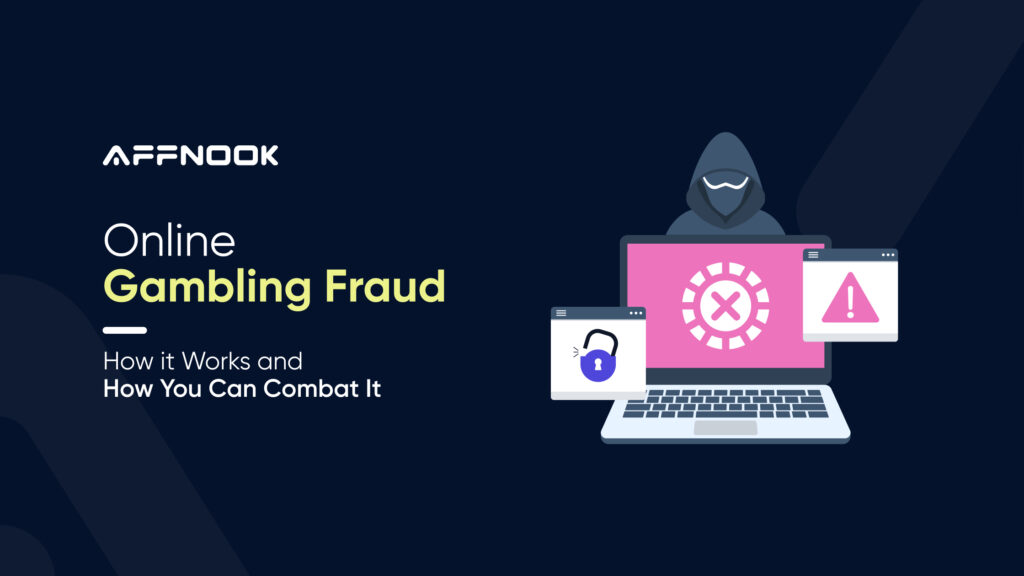You’ve launched your iGaming business and you wait for the users to start flowing in. PPC campaigns, KYC norms, affiliate marketers — it is all configured and in place to achieve the right results.
You’re off to a great start. Everything is going well initially. Then it begins.
Alerts go off within your operations. A fake user spotted!
Not by actions or navigational quirks, but through IP addresses. Then another, and one more and a little while later, one more.
As your revenue and operation size grows and more brands are introduced, this trickle becomes a pour. The instances of bad actors and poor practices in the online gambling sector will continue to grow manifold, unless checked by effective systems in place.
But why does this happen in the first place?
And how to identify it before it hits your pocket?
That’s the key to preventing and controlling the wide prevalence of online gambling fraud. Let’s understand the scope and scale of this problem first.
What is iGaming Fraud and How Common is it?
Any unethical activity aimed at online gambling platforms, in an attempt to extract money or benefits from them, which result in a financial loss for the operator or brand concerned can be termed as fraud in the iGaming industry.
Events of this nature may target the iGaming platform itself, users of the platform or even promotional mediums used by the business.
Such threats can come from seasoned fraudsters who attack ventures of this nature on a regular basis, or from amateurs seeking to make a quick buck through money laundering or associated activities. However, no matter who initiates such an attack on your online gambling business, it is critical to be aware and take steps to neutralize them.
For that, you must know how often this type of situation is likely to occur.
Is Online Gambling Fraud Common?
Unfortunately, the answer is yes.
The occasions when fraud impacts iGaming operations are frequent. The scale of financial transactions involved, and the previous historical linkages the industry shares with financially criminal activities, such as money laundering, false accounting and alcohol and drug running, make online gambling especially susceptible to such incidents.
Fraud itself has evolved and grown massively in recent years.
Over $300,000 were lost by businesses, across industries, in 2024 each time a fraud attempt was made.
According to a Sumsub report, online gaming fraud has continued to grow at 64% per annum every year since 2022. Such a heavy load of suspicious activity signals the sheer amount of problematic behaviors prevalent in the iGaming space.
Another factor is the heavy regulatory environment.
While many businesses are able to operate profitably by following the rules, several fall behind and choose the shorter path to success — by running grey or black-market operations.
Due to their covert nature, such businesses face even more attacks from fraud elements and are unable to report or prevent them effectively.
Types of Online Gambling Fraud
When it comes to catching out the fraudulent activity prevalent in the online casino industry, you can only do so if you know how the fraud works. To understand this, let’s go over the major types of fraud in this sector.
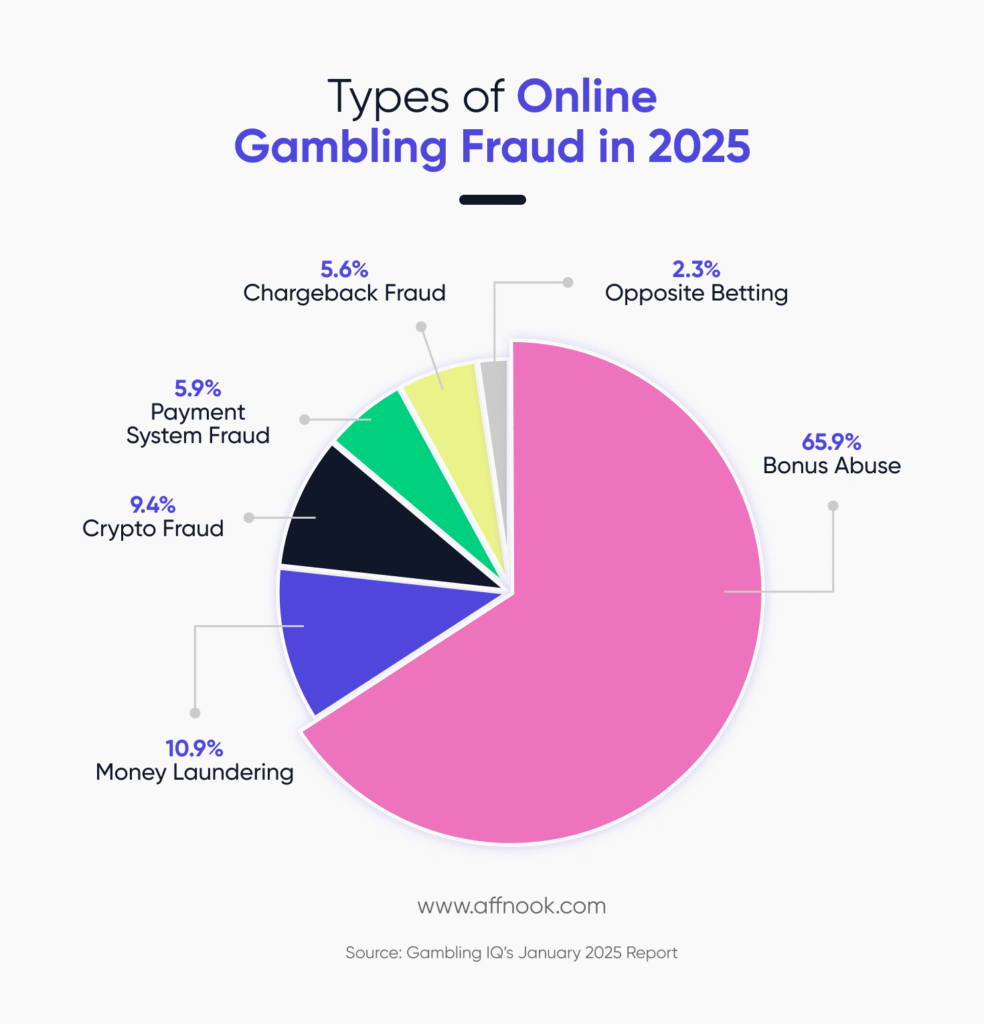
Player-driven Fraud
Broadly, players or user activities can sometimes be fraudulent in nature. This may be aimed at taking advantage of the sportsbook or platform’s features, bonuses and other benefits. Such an intent to cheat the system may present in the following ways.
Bonus Abuse
Operators and brands seek to entice users through bonuses. Some bonuses are shared on sign up, some after being engaged for a specific amount of time and others are focused on driving retention.
The most frequently abused type of bonus is the offer on registering on a platform.
It costs operators up to 15% of their annual revenue, according to Gambling IQ. Over 65% of the online gambling fraud comes from the abuse of bonuses, free spins and other sign up offers.
Identity Theft
Bad actors make use of identity theft to steal funds for gambling or riddle an unsuspecting individual with gambling debts generated by them.
How does this happen?
By beating the in-built KYC and other verification checks on an iGaming platform, a user can use someone else’s bank account or card details to make a deposit. They can also employ it to collect withdrawn money without detection.
Although a traditional form of fraud, this type of activity impacts online gambling greatly. Over 50% of identity theft fraud comes down to the usage of forged documents.
Chargeback Fraud
When users deposit money to gambling or place a bet regularly, it is possible for a transaction to get recorded when the user claims they didn’t make it. Platforms, in this case, allow users to dispute the charge through their bank.
This will result in a chargeback that is refunded to the user’s original payment method.
Sometimes, players may contest charges which are actually made for real bets placed, or real games played. In such a case, banks may still recall the charge — which the operator may have to write off, without contest. This online gambling fraud represents over 5% of all fraud cases in this industry.
In this instance, not only will businesses lose the deposit, but they’ll also be burdened with chargeback fees and operational costs resulting from this reversal.
A type of chargeback that operators and brands may face is ‘friendly fraud’. A real, engaged user may place a bet which leads to loss. As a result, they may seek a refund on their play, citing it as unauthorized.
Chipdumping or Gnoming
When multiplayer games are run on online gambling websites, the same individual may present as more than one of the players to change the outcome of the game. All the ‘players’ in this case may try to drive a favourable outcome for a single user profile.
Such an incident presents heavily in the space of online poker, where intense games seem to create natural outcomes by manipulating the game.
Money Laundering
A well-known method of moving around money, it has often been associated with offline gambling and casinos too.
In the online space, the large-scale movement of money may bring fraudulent elements to it. This type of online gambling fraud may be evident in the following ways:
- Smurfing or structuring of deposits to avoid detection.
- Quickly depositing and withdrawing money, without any interest in gameplay.
- Use of anonymous payment methods like prepaid cards and cryptocurrency.
- Lack of a clear pattern in gambling behaviour, which does not seem to be focused towards winning.
- Location masking or using VPNs to bet in even regulated geographies.
- Heavy spends on in-game currency without matching in-game engagement.
- Multiple withdrawals which are below the AML reporting threshold, to avoid raising alarms.
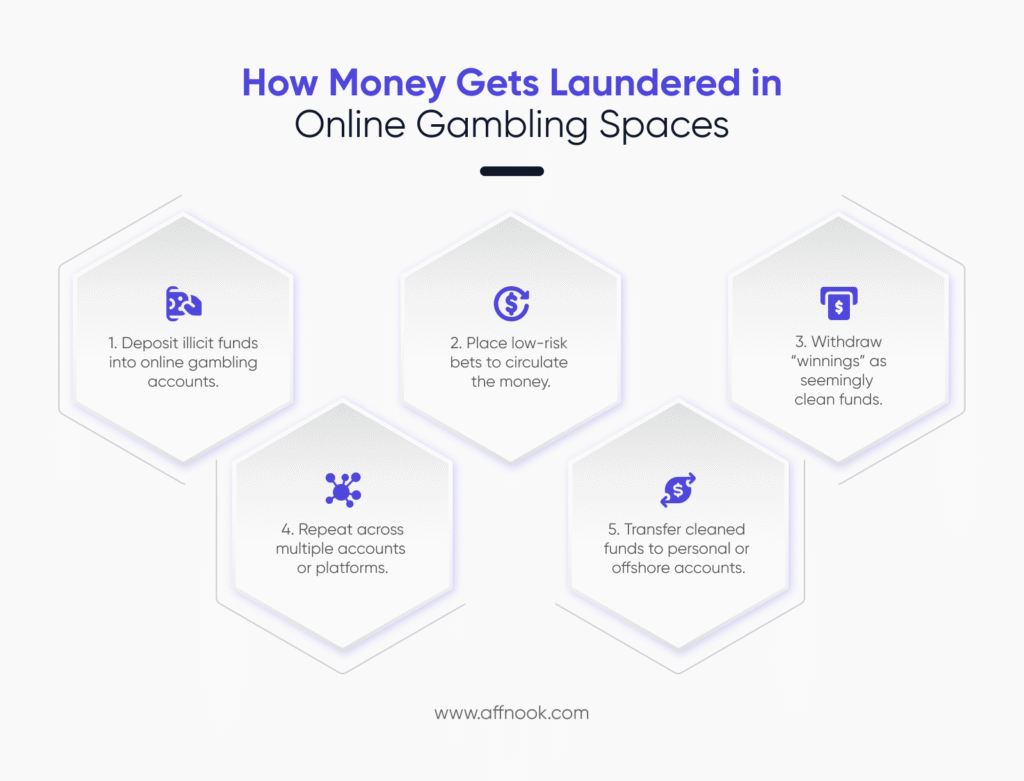
While all these behaviours may not present themselves at once, even a few of them together are sufficient to raise alarm.
Account Takeovers
A real, legitimate user’s account may suddenly become inaccessible to them. In this case, a hacker may gain access to the player’s account and begin using it for their own purposes.
Sometimes the user may be aware about it after it has already happened. When players are intermittently active, they may even be unaware about the fact that their account is being run by someone else.
When this happens, the hacker may empty the account of wins or deposits.
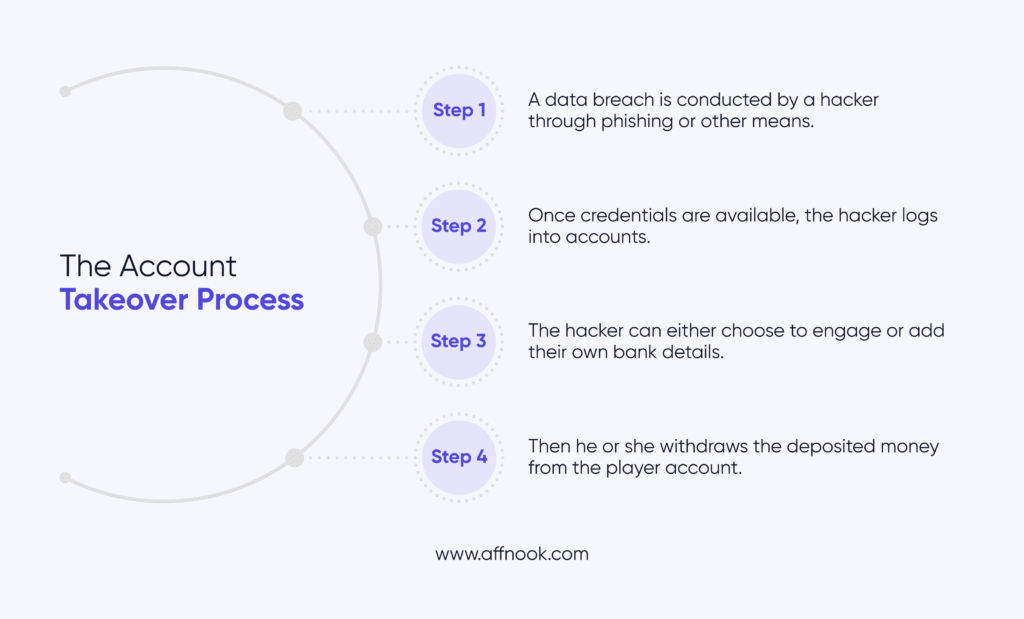
This online gambling fraud can be detected by operators with relative ease. The tell is simple: user activity will follow unfamiliar patterns and account details or payment methods may change overnight.
Account takeovers have grown manifold recently, a Sumsub report states. It’s expanding at over 250% every year, as compared to a growth rate of 155% between 2022 and 2023.
AI Deepfake Scams
As AI exploded into the common consciousness, the misuse of its capabilities to carry out fraud has become more and more clear.
While identity theft is one of the most identifiable ways in which this presents, a more minute observation turns up several other formats. Here are some of them:
- Spoofing of biometric measures by ‘face-swapping’ or using synthetic videos.
- Using AI voice manipulators to speak to customer service and gain access to accounts.
- Creating deepfake avatars to register multiple times for bonus abuse.
- Pretending to be representatives from regulatory bodies to extract “fines” or “penalties”.
- Building social media profiles with AI characters to spread false information or bad links amongst users.
Carding
In this type of fraud, individuals use stolen card details to deposit money into their accounts. Soon this money is withdrawn into their own accounts, turning ‘illegitimate’ funds into valid withdrawals.
Here, the platform is used as a conduit to transform illegal funds into ‘white’ money, which are technically the proceeds of a crime.
At this point, it may become clear that online gambling fraud has many faces. However, this is not the end of the ways in which schemes are carried out to defraud operators and brands.
iGaming Affiliate Marketing Fraud
The other kind of fraud prevalent in the iGaming industry happens at the promoter level. Someone who may be onboarded to market the games or brands available on a platform may also engage in fraud to dishonestly secure advantages.
Let’s understand how this happens.
1. Fake Traffic through Bots or Data Centers
Affiliate marketers are paid through a cost per action or acquisition (CPA) model when user acquisition is a primary objective.
This is often the case for new operators or brands that are building up a player base. Here the action could be a simple link click or registration.
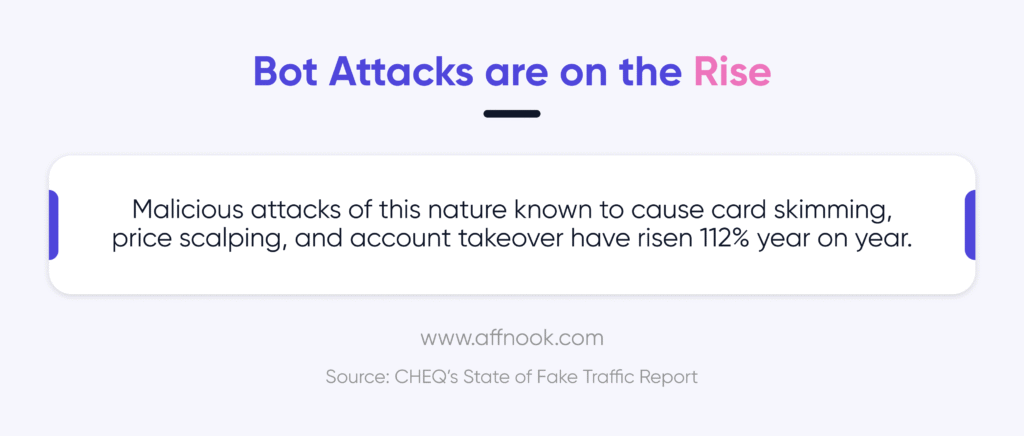
Deceitful affiliates flood the affiliate link with clicks using bots or data centers, which have the capability to add thousands of clicks every hour or so. As a result, the affiliate makes a commission on every action counted, while the operator is stuck with fake traffic.
2. Fake Conversions
This online gambling fraud is an extension of the fake traffic issue.
Going one step further than simply drawing in artificial clicks, iGaming affiliates may induce false sign ups or registrations on to your website. This involves the use of bots, multiple accounts set up by the same person, VPN-based sign ups or even using AI to do this.
The goal is simple: gather sign-up bonuses and other offers, or remain a user long enough to get the affiliate payout for completed actions. As soon as the commission is triggered, the users are likely to withdraw their deposit and leave the account dormant.
As a counter-measure, affiliate managers have begun to set multiple actions as conversion events, leading to a longer timeframe for payout. Alternatively, such measures also ensure most of the users coming onto a platform are genuine because they behave like real players.
3. Multiple Account Creation
A single user may create several accounts using an affiliate link to show multiple conversion events. This type of online gambling fraud is fairly common in the affiliate marketing process.
But, how can such a fraud be detected in the first place?
Promoters who rely on such tactics often use VPNs to mask the location for each conversion event. Or, they may use various details but the payment credentials may be the same across accounts. There are several other tells of this nature, which help in identifying when such an affiliate marketing fraud has occurred.
4. Commission Cheating
Affiliates who play into fraudulent activities try to secure unfair commission payouts. It basically means techniques and tools are used to cheat the process, and get attributed for conversions they have not actually secured.
This could be applicable in two ways:
- Either the affiliate has altered the tracking code of another affiliate, and is securing attributions to themselves.
- They have created players and users from thin air, and are now using them to farm payouts from operators and brands.
5. Affiliate Hijacking
A type of commission cheating, this online gambling fraud happens when an affiliate’s link is taken over by another affiliate without their knowledge to claim their commission.
Let’s observe this with an example.
If there are two affiliates, A and B, A can change the tracking link or inject scripts into the operator’s website or even apply malware to claim credit for B’s work. In such a scenario, the users created through A’s work will instead show up as B’s contribution, skewing the payouts whenever they are made.
A will thus be cheated of their rightful commission, while B makes bank on A’s promotions.

Depending on the type of affiliate promotion the dishonest affiliate is running, they could be hijacking links wherever they are placed. The example above shows how this works in the case of an affiliate running PPC campaigns.
Online Gambling Fraud Prevention
It is estimated that all kinds of fraud together cost the iGaming industry around $1 billion annually. But it doesn’t have to be this way. Robust measures and advanced tools can help you act against the bad faith actors out to drain your revenue.
For Players
Three-fourths or 76% of fraud situations occur during regular account usage. Usually stringent usage checks end at the KYC conducted during sign up, which makes such events commonplace.
Let’s examine what players can do for effective online gambling fraud prevention.
1. Knowing Regulated from Unregulated
Players must be made aware of whether the online gambling or betting service they are using falls under the purview of regulation or not. This simply means that an operator or brand needs to let their audience know that they have a valid license to operate freely in the market where they exist.
There’s no pro-tip here. You need to simply declare it to your audience. Display it where it is most visible and let users know they are safe on your website.
No tricks or big reveal is required. Just tell the user what your licensing duration is and why licensing matters in iGaming.
Unaware users will benefit from knowing how to identify regulated markets from unregulated ones, and the growing trust in your operation will just be a cherry on top!
2. Help Them Keep an Eye Out for Fairness
It is crucial to have the right certifications and algorithms that promote fairness and enforce house rules, no matter what games you provide. In the case of games of chance, this is even more important.
If users feel as though they have no chance of winning, they’re going to be increasingly unlikely to return to your platform to engage ever again.
For randomizing effects, RNG credentials from eCOGRA or GLI can be effective. Players can be made aware of such efforts made by your operation or brand to safeguard their interests.
For Operators
1. Use Fraud Detection Tools
Your primary way of fighting against online gambling fraud is to make sure you have the tools for it. Effective armour and early detection features can be a great deterrent against these types of attacks.
Here are some of the ways in which you can safeguard yourself:
- Predictive Analytics for catching unusual player behaviours such as sudden deposits or withdrawals, unusual betting patterns, etc.
- Implement strong KYC checks, including follow up checks to ensure accounts are safe.
- Enable two-factor authentication to add a layer of protection.
- Keep software updated and bug-free by regularly updating your systems.
Make use of third-party providers on your platform to foolproof the entire customer verification process. Set up alerts that are triggered whenever suspicious activity is detected or is likely to occur based on predictive analytics.
AI tools can now be harnessed to preempt and act even faster. Based on previous customer patterns, they can ascertain abnormalities by sifting through large volumes of data in seconds. Native LLMs can add even more functionalities beyond security too.
2. IP and Device Fingerprinting
Every unique user on your platform must have a unique device ID and an IP address. Both of these pieces of information can be recorded and checked from time to time for consistency.
Here’s what you can do to limit online gambling fraud:
- Monitor for proxies, location changes and VPNs in use. Restrict accounts that do these things.
- Disallow the creation of multiple accounts from a single IP address.
- Add a layer of behavioural analytics by cross-checking device data on betting patterns and transaction behaviour.
- Include additional alerts for situations where multiple problematic behaviours are flagged around the same time.
The best you can do is watch out for instances of bad faith and check them as soon as they occur.
3. Affiliate Tracking Software
To control fraud by affiliate promoters, operators and brands can run their affiliate programs through affiliate marketing software that comes with in-built fraud detection and prevention technology.
You can rely on a comprehensive affiliate management solution like Affnook to ‘mark’ or simply ‘block’ any attempts at fraud by any of your affiliates.
The Affnook software takes charge and restricts suspicious activity that presents in the following ways:
- Bot or data centre traffic
- Masked locations or VPN-driven traffic
- Users coming from high-risk IP addresses and geographies
- Players coming from unknown devices
- Repeated offenders who carry on with one or more of these activities
This type of advanced fraud detection is built into the tool, without the need for any add-on features. It acts as an effective preventer of major online gambling fraud types.
Many users have seen great success with the fraud detection feature. One client has even seen up to 15% reduction in fraudulent activity within their affiliate program, coupled with a big boost in usership and revenue.
4. Know Your Affiliate (KYA) Requirements
Similar to the KYC process, the KYA process is used to check the integrity, practices and reputation of the partner marketers you’re relying on.
Operators experience benefits beyond fraud limitation from this process. It helps in:
- Cross-checking references
- Confirming the legitimacy of the affiliate’s promotions
- Verifying traffic sources being used
- Vetting the promotional process of the affiliate
For affiliates who are tempted to rely on poor tactics, it acts as an effective check. It prevents the instances of:
- Fake conversions
- Incentivized Traffic
- Link hijacking
- Fake sign ups
An added benefit of using the Know Your Affiliate verification process is the ad guidelines’ compliance in various geographies. By using this single step, you can overcome multiple challenges and fix problems related to fraud.
5. Transparent Relationships with Affiliates
Online gambling fraud doesn’t simply result from poor intentions on the part of players and affiliates. It also comes from persistent issues that may be slipping under the radar on your end.
Affiliates who receive clear instruction from operators on their terms, conditions and anti-fraud policies, they’re less likely to pursue unsavory means of achieving results. Such clarity will reduce attempts at fraud, therefore, minimizing the requirement for blocking such attempts.
Across campaigns, partner marketers should be given access to their own performance in real-time — something platforms like Affnook ensure happens. This reduces chances of disputes over conversion KPIs when the time for payouts rolls around.
However, even after all this, if a case of fraud is detected, a line of open and clear communication should be able to resolve the issue.
Maintaining such a collaborative relationship across affiliate partnerships assures partners of their value to the business, and helps bring down malicious behaviours. As a result, honesty is incentivized and a more long-term relationship can be nurtured.
Regulations Against Online Gambling Fraud
Across regulated geographies, licensing bodies have created norms to fight against fraud that occurs in the online casino and gambling sector.
While recognizing it to be a prominent challenge, stringent measures have been put in place to resist revenue loss, and maintain user trust. Moreover, the laws and guidelines laid down seek to limit the incidence of illegal activities like money laundering and identity theft.
Here are some examples of regulations in place to bring down fraud.
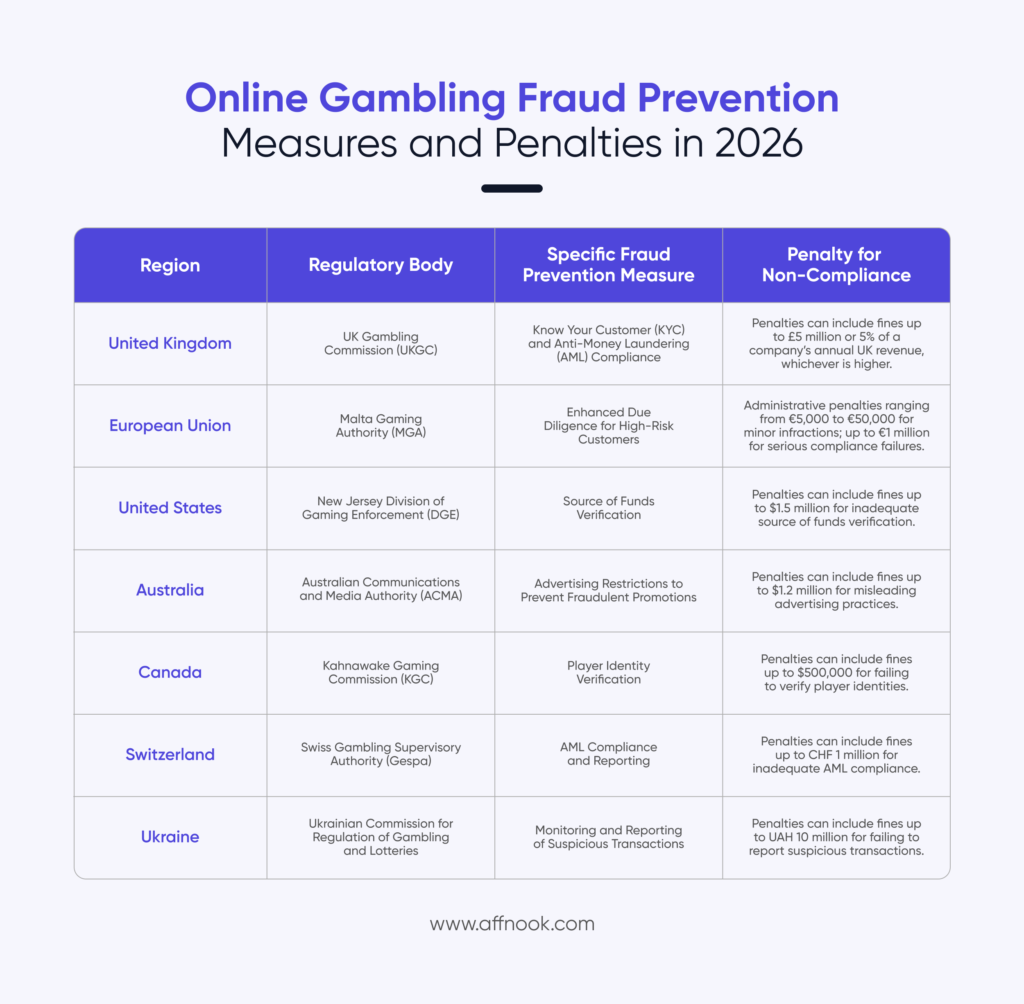
The rules are comprehensive and pervasive across regulated markets. Yet, only rules are not enough to maintain balance.
It is critical that operators and brands take these challenges seriously and act accordingly in enforcing these stipulations. Any laxity in enforcement is going to result in fines and penalties. In outlier cases, this may also lead to license suspension and bans for operators.
Summing Up
There are several challenges lined up for operators and brands to deal with, as they step into the iGaming business. Some of these are bigger than others.
Many report online gambling fraud to be a significant challenge for online gambling businesses. Even more so for new entrants in this industry. As the iGaming industry balloons from $540 billion in 2023 to $744.8 billion in 2028, the attempts at siphoning away some of this revenue are likely to increase.
Operators can avoid becoming sitting ducks in this situation.
For every fraud type there is — from gnoming, bots and carding to URL hijacking, bonus abuse and crypto fraud — businesses have the means of taking back control. The use of fraud prevention tools simply cannot be understated.
Regulators, too, have taken note and created rules and laws to limit fraud in iGaming. Lack of compliance comes with itemized penalties, fines and due process for limiting the activities of the business.
Fraud, however, is an ever-evolving threat. As fast as prevention and detection tactics are in place, a new form may take over.
The only way to excel in your struggle against fraud is to be proactive and ever-ready. The real question is, are you?
Connect with Affnook’s team to understand how online gambling fraud detection software can assist you in this battle.
Help Centre
What is online gambling fraud and why does it keep growing?
Online gambling fraud includes any bad or unethical tactic used to cheat iGaming platforms — think: bonus hunters, stolen identities, or money launderers. It’s growing so quickly because of the presence of high-value transactions, patchy regulations in some regions, and constantly evolving fraud techniques to counter detection measures.
Is fraud really that common in the iGaming space today?
Unfortunately, yes. Fraud is not just a one-off. It’s slowly becoming a recurring problem across the iGaming operations. Reports show online gambling fraud has grown by 64% annually since 2022. Operators in less-regulated or grey markets face the worst forms of it, and usually have no recourse.
What are the major types of fraud in online gambling today?
The most common types are bonus abuse, chargeback fraud, fake accounts, identity theft and affiliate marketing fraud. If you’re running a platform (as an operator or brand) or affiliate programs for promotions (as an affiliate network), it’s vital to know how these types of bad actors function so you can stop them before they are able to act, saving both time and money.
What is chargeback fraud? How does it affect betting sites?
A chargeback occurs when users dispute charges (often after losing bets), by claiming they didn’t make the transaction in the first place. Whether it’s legit or not, the bank often sides with the user. This usually means the operator eats the cost, plus fees of reversing the transaction.
What makes “Know Your Affiliate” (KYA) more than just a checklist?
KYA works like KYC, but for your marketing partners or affiliate publishers. It checks who they are, how they promote, and where their traffic comes from. Think of it as a proactive way to avoid being blindsided by fake leads or bad actors in your affiliate network.
